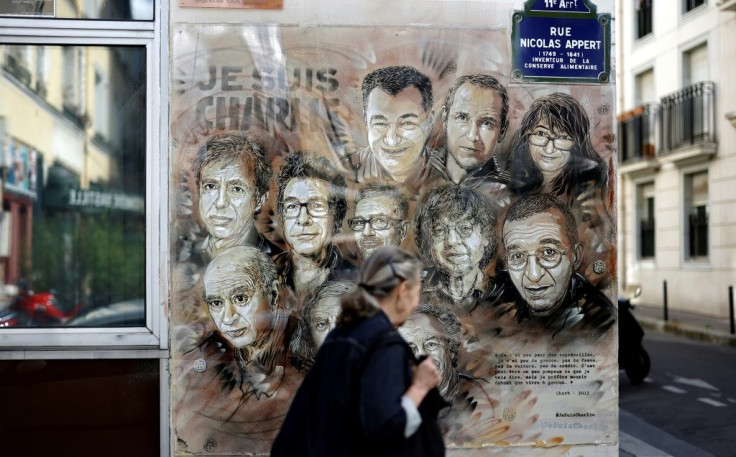Charlie Hebdo Reprints Controversial Muhammad Cartoons Before Terrorism Trial

French satirical magazine Charlie Hebdo has reprinted controversial cartoons of the Islamic prophet Muhammad that prompted an attack against the magazine’s Paris headquarters in January 2015. The republication comes as 14 individuals tied to the attack go to trial Wednesday.
"We will never lie down. We will never give up," cartoonist Laurent "Riss" Sourisseau wrote in an editorial that will be published in this week’s edition of the magazine. "The hatred that struck us is still there and, since 2015, it has taken the time to mutate, to change its appearance, to go unnoticed and to quietly continue its ruthless crusade.”
During a visit to Lebanon on Tuesday, French President Emmanuel Macron refused to condemn the republication of the cartoons.
"It's never the place of a president of the Republic to pass judgment on the editorial choice of a journalist or newsroom, never. Because we have freedom of the press," Macron said. "There is in France a freedom to blaspheme which is attached to the freedom of conscience. I am here to protect all these freedoms. In France, one can criticize a president, governors, blaspheme."
Twelve people were killed in the attack, which was committed by two French brothers of Algerian descent, Saïd and Chérif Kouachi. The brothers stormed into the offices of the newspaper with rifles, and identified themselves as members of the al-Qaeda on the Arabian Peninsula terrorist organization.
After the attack, the two brothers left in a getaway car. A manhunt by French authorities then ensued, with the brothers killed by police two days later.
Fourteen accomplices allegedly assisted the brothers with the terrorist operation.
“If (the attackers) committed this butchery, it is because they believed in an ideology and this ideology will have to be put on trial. That’s what I’m waiting for,” former Charlie Hebdo journalist Zineb el Rhazoui told Reuters about the trial.
The attack resulted in a debate about the role of freedom of speech in French society and in the West. Pictures and depictions of Muhammad are frowned upon in Islamic cultures, with France having a large Muslim population.
French President Francois Hollande called the slain journalists “heroes,” with Paris Mayor Anne Hidalgo claiming the event was an “attack on the values of our republic.”
The phrase “Je Suis Charlie” or “I am Charlie” was used by supporters of the magazine, with the slogan trending on social media in the wake of the attack.
Other leaders who condemned the attack included President Barack Obama, German Chancellor Angela Merkel, Russian President Vladimir Putin and Israeli Prime Minister Benjamin Netanyahu.
In the Muslim world, Lebanon, Iran, Saudi Arabia, Jordan, Bahrain, Morocco, Algeria and Qatar all denounced the attack. Multiple terrorist organizations praised the attack, such as Boko Haram, Al-Shabaab, the Taliban and the Islamic State of Iraq and the Levant.
Charlie Hebdo has described itself as secular, anti-racist and far-left. The paper began showing depictions of Muhammad in 2006, with the magazine’s office firebombed in November 2011 over its satirical take on Islam.
© Copyright IBTimes 2025. All rights reserved.





















